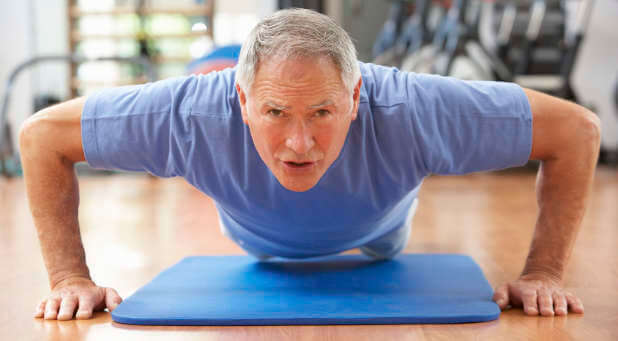We have no control over the fact that we are getting older, but we can control how well we age. With a healthy diet and exercise, we can decrease and even reverse the effects of aging by preserving muscle and cardiovascular health.
The trick is knowing the smartest strategies for doing so.
“As we get older, our bodies undergo several changes, including loss of muscle mass, decreased muscle strength and increased body fat,” Dr. Kevin Christie, a leading sports medicine expert from Florida, tells Newsmax Health. “You also suffer a decrease in aerobic or lung capacity.
“After the age of 30, you can lose as much as 5 percent of muscle mass each decade and after age 50, that decline in muscle mass increases even more. A recent study concluded that people lose a whopping 30 percent of their muscle mass between the ages of 50 and 70.”
The reason for this loss is that muscles take longer to respond to brain signals as we get older, says Dr. Christie. The water content in your tendons and ligaments decreases, making the tissues stiffer and less able to tolerate stress.
“Your heart muscle becomes less efficient and cannot propel large quantities of blood quickly throughout the body, so you tire more easily and take longer to recover,” he says.
“The best way to combat these changes and slow down the biological clock doesn’t come in a pill. Proper exercise can help preserve muscle mass, strength and lung capacity. Regular exercise is also effective in preventing age-related cardiovascular disease, diabetes, arthritis, cancer and pulmonary disease.”
Here are Dr. Christie’s seven recommendations for a well-rounded, age-proofing exercise program:
1. Devise a fitness program that focuses on the four different categories of exercise: endurance, strength training, balance and flexibility. Strength and resistance training have been scientifically shown to be the most effective in preventing and reversing muscle loss.
2. Perform exercises that give you more bang for your workout buck. For example, squats, dead lifts, lunges, rows and pushups recruit more muscle groups than bicep curls and leg extensions that isolate one area.
3. Progress gradually to heavier weights and increased resistance. Mix up your routine by changing the number of repetitions or sets and add a variety of movement to the exercises. For example, you may want to combine bicep curls with lunges. Or to challenge your balance, perform the curls standing on one foot.
4. Set goals and reassess those goals every three months. You should change your exercise program frequently rather than doing the same routine month after month because your muscles get used to the same movements. It can be as simple as reducing rest periods between sets or increasing repetitions to build muscular endurance.
5. Be sure to follow recommended activity guidelines for older adults—150 minutes of exercise per week, which can be broken down to 20 minutes per day for seven days, 30 minutes per day for five days, or 50 minutes per day three days a week. Always stretch before and after a workout. Adding a yoga or Pilates class to your routine can help keep the spine strong yet flexible.
6. Don’t delay getting started, which can be the hardest part, and push yourself when you feel too tired or busy to work out. If you feel overwhelmed at first, most gyms offer free personal training for the first week or two when you join. The trainer can do a physical assessment and help design a workout program that will suit your individual needs and make you more likely to stick with it. As always, check with your doctor before embarking upon any fitness program. Let your trainer know if you have issues such as hypertension or back injuries. Chances are that sticking with a healthy exercise program may alleviate or eliminate certain medical conditions.
7. Remember that exercise does not replace a healthy lifestyle. Eliminating processed foods, sugar, avoidance of smoking and moderate intake of alcohol can all contribute to longer, healthier life.
For the original article, visit newsmaxhealth.com.














































